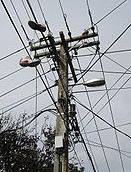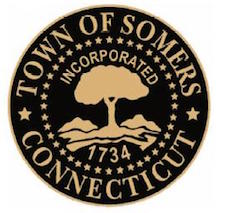
Fast, affordable Internet access for all.

In Connecticut, local municipalities want to take advantage of the state’s unique “Municipal Gain Space” but invoking the law has not been hassle-free. As towns try to place fiber-optic cables on this reserved section of utility poles, questions arise that need answering.
Giving Towns Some Room On The Poles
The Connecticut statute grants state departments and municipalities the right to use space on all of the approximately 900,000 utility poles sitting in the municipal Rights-of-Way (ROW), regardless of ownership. One of the state's electric providers and either Verizon or Frontier jointly own most of the poles.
The law was created in the early 1900s for telegraph wiring and as new technologies and wire types evolved, a number of law suits ensued. Cities and state entities usually won, preserving the space, but the process of getting attachment agreements approved became more burdensome and expensive. In 2013, the state legislature amended the law so municipalities could access to the space “for any use.” The change opened the door for hanging fiber for municipal networks and partnering with private providers.
A Little Help Here...
In theory, it seems simple but in practice, pole administrators - Electric Distribution Companies (EDCs) and telephone companies - and government entities need guidance. As communities across the state band together to improve local connectivity and try to use the law, they have uncovered its flaws. It has potential, but the Municipal Gain Space law needs sharpening to be an effective tool. Its application rules are not sufficiently defined and a number of technical issues are not addressed.
The state’s Public Utility Regulatory Agency (PURA) has the authority and responsibility to establish rules to settle the problems with the law. Deploying a municipal network is no small task; the Office of Consumer Counsel (OCC) and the State Broadband Office (SBO) hope to simplify the process for local communities. They have petitioned PURA to clarify the Municipal Gain Space rules. In their formal petition, they ask PURA to investigate and remove barriers that interfere with the “timely and efficient use of Municipal Gain.” Read the petition at the PURA website.
Lack Of Direction Jeopardizes Local Projects
We spoke with Elin Swanson Katz, Consumer Counsel, and Joseph Rosenthal, Principal Attorney from the OCC. Bill Vallee, the state's Broadband Policy and Program Coordinator joined the conversation. They described how a lack of direction for pole administrators and other gaps in the Municipal Gain Space law negatively impacts deployment for municipalities that decide to employ it. From inception to implementation, communities find themselves confronting some common questions.
A city may decide to invest in a project and use the Municipal Gain Space law to determine a route for their fiber-optic network cables. As they move forward, they find that there are a number of unresolved questions, beginning with where on the pole the Municipal Gain Space should be located. Often the other entities that are using the poles have not reserved space for a municipality’s unrestricted use.

Once they answer the important issue of where on a pole a cable belongs, the next question is who pays to rearrange the existing wires so the new cable can be attached? For example, if a telephone company hung its wire but failed to reserve the space for the town to use later, who should pay for the make-ready costs when the town decides to use its statutory space under the Municipal Gain Space rule? How should make-ready costs, which can make or break a municipal fiber project, be allocated?
Time is critical; that holds true in the telecommunications industry in a number of ways. New rules would also establish who would be responsible for assessing the condition of the poles to expedite projects that depend on pole availability. Scheduling trucks and technicians from the various entities using the poles, fragile financing schedules, deployment delays that cause subscription losses, are only a few factors impacted by timing that affect the viability of a public or private network.
Limiting Competition With “An Offer You Can’t Refuse”
As communities have moved forward with fiber projects, some have entered into agreements with pole owners whose draft pole attachment agreements dictate the terms. Local communities may feel they have little choice, especially if they depend on critical funding tied to a tight deadline.
Some pole attachment agreements violate the law because it includes language that restricts municipalities’ use of the Municipal Gain Space. By limiting the space to “government use,” pole owners are able to prevent partnerships between municipalities and other Internet Service Providers (ISPs) who may wish to provide services to businesses or residents via publicly owned infrastructure. Such a restriction eliminates a range of options for local communities who may not have the ability to operate and maintain a fiber network alone. Incumbent providers are using their pole attachment agreements to stifle and delay municipal networks, including those that involve private partners, as a way to limit competition.

Local communities must go out of their way to avoid these restrictive agreements if they want to preserve their ability to one day use their fiber for something other than a "government use."
For example, Somers had been awarded state funding to connect to the state education network but refused to sign the pole attachment agreement from Frontier. The resulting delay almost caused them to lose the state grant and they eventually engineered the network to avoid Frontier poles so they would not have to restrict away their Municipal Gain Space.
As part of the petition, the OCC and SBO are asking PURA to develop rules that could be used to build a standard agreement between municipalities and the telecommunications companies or EDCs that own the poles.
Washing Away The Mud For Everyone
In their June 21st news release, the OCC emphasized that the Municipal Gain Space rules affect a number of entities:
Other interested stakeholders in a PURA proceeding regarding the municipal gain would likely include the Single Pole Administrators (the two Electric Distribution Companies), the incumbent telephone companies, the several cable operators, long-term infrastructure investors, the diverse set of utilities, municipalities, investors, other entities that already engage in pole attachments, and Connecticut business and technology promotion groups seeking high-speed internet access.
"The process is daunting and in some circumstances clear as mud...That whole process needs to be clarified," Katz told the Hartford Courant in June. If PURA agrees, the Municipal Gain Space may soon be sharpened and ready to break new ground for Connecticut communities.
Join us live on Thursday, September 22, at 4pm ET for the latest episode of the Connect This! Show. Co-hosts Christopher Mitchell (ILSR) and Travis Carter (USI Fiber) will be joined by regular guests Kim McKinley (UTOPIA Fiber) and Doug Dawson (CCG Consulting).
Join us live on Thursday, September 22, at 4pm ET for the latest episode of the Connect This! Show. Co-hosts Christopher Mitchell (ILSR) and Travis Carter (USI Fiber) will be joined by regular guests Kim McKinley (UTOPIA Fiber) and Doug Dawson (CCG Consulting).
Join us live on Thursday, August 18th, at 3:30pm ET for the latest episode of the Connect This! Show. Co-hosts Christopher Mitchell (ILSR) and Travis Carter (USI Fiber) will be joined by regular guest Kim McKinley (UTOPIA Fiber) and Casey Lide, Partner at Keller and Heckman.
